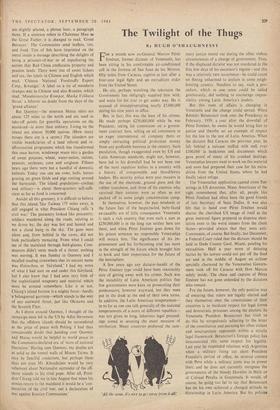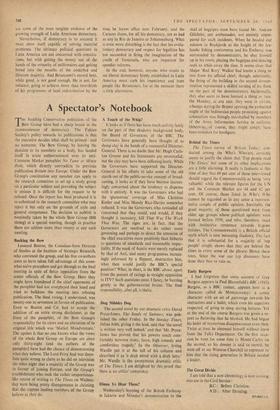The Twilight of the Thugs
By HUGH O'SHAUGHNESSY FOR a month now ex-General Marcos Perez Jimenez, former dictator of Venezuela, has been sitting in his comfortable air-conditioned cell in the fortress of San Juan de los Morros, fifty miles from Caracas, captive at last after a four-year legal fight and an extradition order from the United States.
- He. sits, perhaps watching the television the Government has obligingly supplied him with, and waits for his trial to get under way. He is accused of misappropriating nearly £5,000,000 during his nine years in office.
But, in fact, this was the least of his crimes. He made perhaps £250,000,000 while he was President, taking his commision on a govern- ment contract here, selling an oil concession to an eager international oil company there or simply extracting political protection money from any profitable business in the country. Such peculation, though exaggerated even by US and Latin American standards, might not, however, have led to his downfall had he not been one of the most repulsive bullies in a country with a history of irresponsible • and bloodthirsty leaders. His security police were past masters in the use of the electrode, ground glass and the rubber truncheon, and those of his enemies who survived their tortures were as often as not packed off to some jungle concentration camp.
In themselves, however, the past misdeeds or the future fate of the bespectacled, baby-faced ex-caudillo are of little consequence. Venezuela i3 such a rich country that even such a sum as £250,000,000 is in the long run neither here nor there, and when Perez Jimenez goes down for his prison sentence no responsible Venezuelan will mourn him. The significance of his im- prisonment and his forthcoming trial lies more in the strength of the forces which brought him to book and their importance for the future of the hemisphere.
A few years ago any dictator-bandit of the Perez Jimenez type could have been reasonably sure of getting away with his crimes. Such was the instability of Latin American politics that few governments were keen on prosecuting their predecessors, however wayward, lest they were put in the dock at-the end of their own terms. In addition, the Latin American temperament— in so far as one can talk generally of the national temperaments of a score of different republics— was not given to long, laborious legal' proceed- ings aimed at securing the exact measure of retribution. Many countries preferred the sum- 'All the same, it's nice to get away from it all.'
mary justice meted out during the often violent circumstances of a change of government. Thus, if the displaced dictator was not murdered in the first few days of his successor's regime—and this was a relatively rare occurrence—he could count on fleeing unharmed to asylum in some neigh- bouring country. Needless to say, such a pro- cedure, which in one sense could be called gentlemanly, did nothing to encourage respon- sibility among, Latin America's leaders.
But this state of affairs is changing in Venezuela and the change could spread. When Romulo Betancourt took over the Presidency in February, 1959, a year after the downfall of Perez Jimenez, he swore he would bring him to justice and thereby set an example of respect for the law to the rest of Latin America. When the dictator fled Caracas the previous year, he left behind a suitcase stuffed with well over £100,000 in banknotes and documents which gave proof of many of his crooked dealings. Venezuelan lawyers went to work on this material and soon had prepared their case for his extra- dition from the United States, where he had finally taken refuge.
The Venezuelan application caused some flut-- terings in US dovecotes. Many Americans of the right remembered that, after all, people like Perez Jimenez had often been the good friends of late Secretary of State Dulles. It was also felt that to hand over Perez Jimenez would shatter the cherished US image of itself as the great maternal figure prepared to dispense abso- lution even to the worst sinners from the client States—provided always that they were anti- Communist, of course. But finally, last December, a Federal Court ruled that the dictator should be held in Dade County Gaol, Miami, pending his extradition. Half a year more of delaying tactics by his lawyer could not put off the final act and in the middle of August an airliner specially chartered by the Venezuelan Govern- ment took off for Caracas with Don Marcos safely inside. The chase and capture of Perez Jimenez has not gone unheeded by the dictators who remain.
For the future, however, the only positive way of ensuring that rulers are legally elected and they themselves obey the constitutions of their countries is to inculcate respect for legal forms and democratic processes among the electors. In Venezuela President Betancourt has tried to do this by scrupulously adhering to the letter of the constitution and pursuing his often violent and unscrupulous opponents within a strictly legal framework. Betancourt's foreign policy has demonstrated this same respect for legality. Last year he suspended relations with Argentina when a military rising cut short President Frondizi's period of office, he severed contact with Peru while a military junta was in power there, and he does not currently recognise the governments of the bloody Duvalier in Haiti or of Colonel Peralta in Guatemala. It would, of course, be going too far to say that Betancourt has on his own achieved a changed attitude to dictatorship in Latin America. But his policies are sonic of the most tangible evidence of the growing strength of Latin American democracy.
Nevertheless, if democracy is to succeed it must show itself capable of solving material problems. The ultimate political questions in Latin America are not concerned with constitu- tions, but with getting the money out of the hands of the minority of millionaires and getting bread into the mouths of the underfed and illiterate majority. And Betancourt's record here, while good, is not good enough. He is not, for instance, going to achieve More than two-thirds of his programme of land redistribution by the time he leaves office next February; and the Caracas slums, for all his democracy, are as bad as any in Rio de Janeiro or Johannesburg. What is even more disturbing is the fact that his evolu- tionary democracy and respect for legalities has not succeeded in firing the imagination of the youth of Venezuela, who are impatient for speedier reforms.
In the end, however, anyone who wants to see liberal democracy firmly established in Latin America must curb his impatience and trust people like Betancourt, for at the moment there is little alternative.







































 Previous page
Previous page